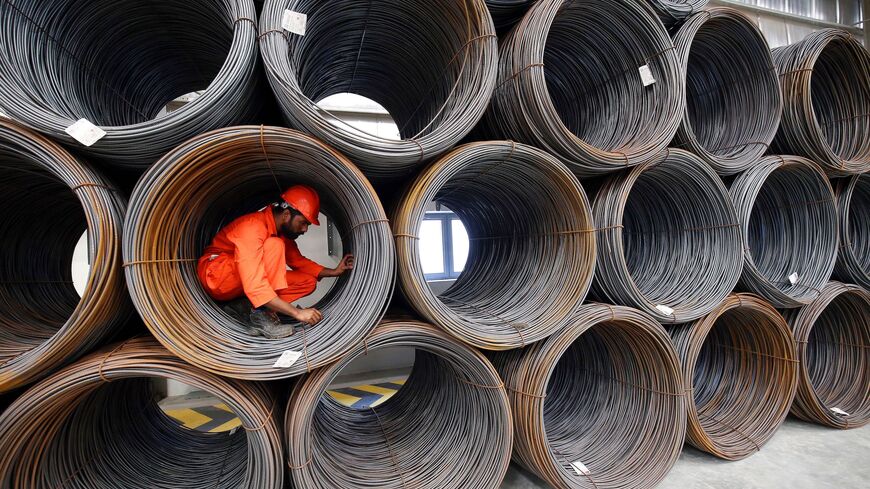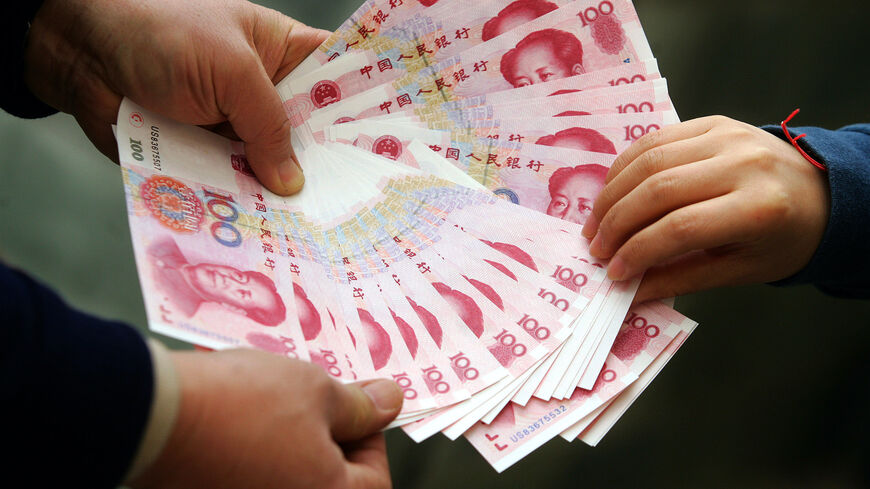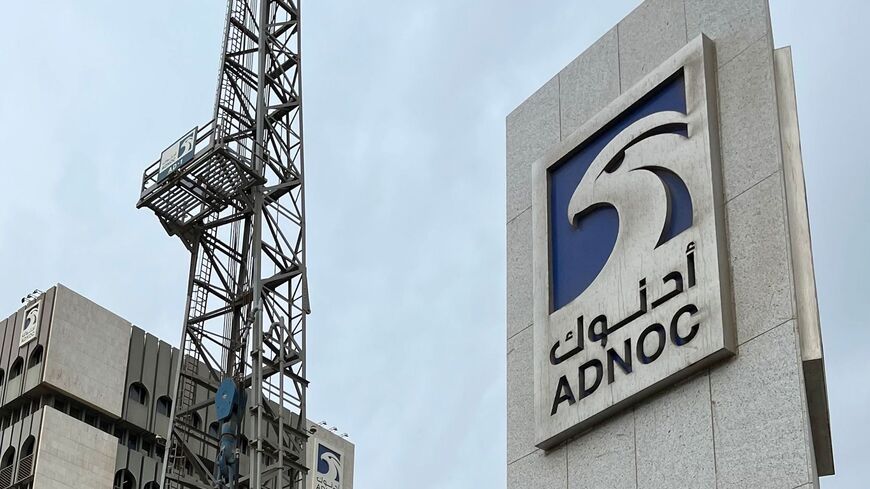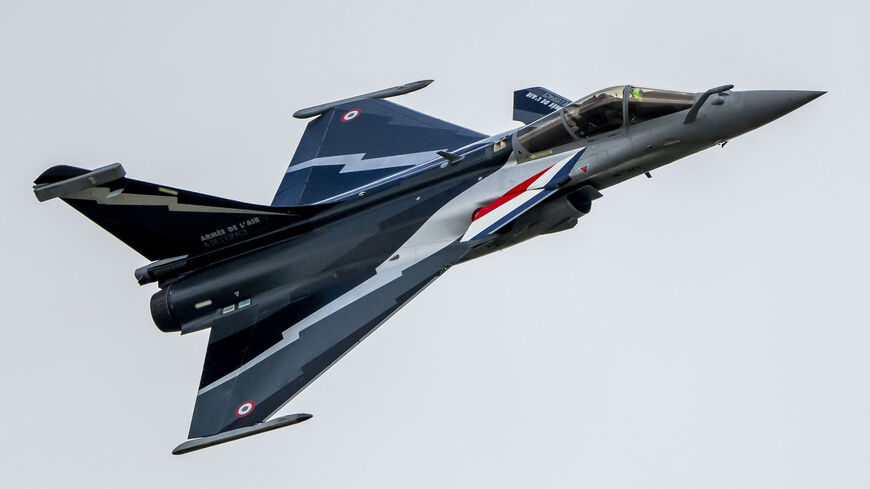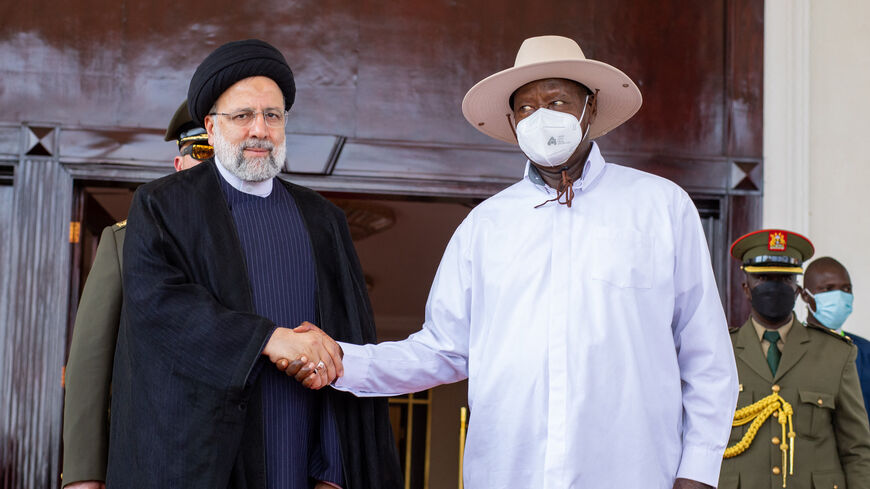China’s push for trade in yuan has downsides for Gulf states
Al-Monitor Pro Members
Sebastian Castelier
Business journalist covering Gulf economies
May 30, 2023
“Don't kiss your dollars goodbye just yet,” the International Monetary Fund’s managing director Kristalina Georgieva warned on Wednesday during the Qatar Economic Forum in Doha. Beijing struck its first-ever yuan-settled energy deal involving Emirati liquified natural gas in the first quarter of 2023. Paying for the import of Gulf fossil fuels in yuan is at the top of China’s list to lay the foundations for a greater global adoption of its currency, officially known as renminbi. But should the practice become more common, Gulf countries would get “most of the downsides.” Yet a global surge of interest in de-dollarization — with a 600% increase in discussions on Twitter and Reddit in the first three months of 2023 — is offering Gulf countries an opportunity to display yuan-settled trade to warn the United States.
- Chinese President Xi Jinping said the world’s second-largest economy, which imported about a third of the GCC’s crude petroleum exports in 2020, will push for yuan-settled oil and gas trade as he met with Gulf leaders in December 2022 in Riyadh. Saudi Arabia has been considering selling some oil to China in yuan instead of dollars for years — the kingdom has traded oil exclusively in dollars since 1974 — but the United Arab Emirates (UAE) struck first. One of China’s largest oil companies and France's TotalEnergies conducted China’s first-ever yuan-settled energy deal in March 2023 involving some 65,000 tons of liquified natural gas (LNG) from the UAE. It follows the Iraq’s Central Bank's decision in February 2023 to allow trade with China in yuan.
- The United States closely monitored the Gulf's appetite for trade in yuan. In February 2023, the dollar accounted for 84.3% of the world’s trade finance, down from 86.8% a year earlier. Meanwhile, the yuan’s share more than doubled to 4.5%, with most of the gain reflecting transactions involving Russia.
- Yuan-settled trade would help China to mitigate currency risks — the yuan is no longer directly pegged against the dollar since 2005, but Beijing controls how it floats to the dollar.
- A major shift to yuan-settled trade, although unlikely in the short term, would protect Gulf countries from risks related to the US dollar’s hegemony. In 2022, the United States and the European Union blocked Russia’s central bank from selling its reserve of dollars, euros and other foreign currencies in retaliation for its invasion of Ukraine. Russian oligarchs’ assets were seized after they proved to be linked to dollar transactions. The situation led numerous nations, including Gulf countries, to “look at other options as a backup channel should anything go wrong,” Nasser al-Shaikh, former director general at Dubai’s Department of Finance, told Al-Monitor. The monetary response to the invasion of Ukraine has offered China a “strong argument” to promote an alternative payment system, said Minxiong Liao, director for Asia-Pacific at TS Lombard, a macroeconomic forecasting consultancy.
- “US influence in Gulf countries has decreased, and Beijing intends to be more active in the region to have more weight on its oil resource,” Liao told Al-Monitor. Still, “most of the downsides” would be for Gulf countries that run trade surpluses with China, said Li-Chen Sim, non-resident scholar specialized in Asia-Gulf relations at the Middle East Institute, a think tank in Washington. In 2021, Oman imported more than seven times less from China than it exported there. “If Gulf countries settle the trade in yuan, then the next question is what are they going to do with all the yuan,” Sim told Al-Monitor. China applies restrictions on the yuan’s convertibility to other currencies. It is less of an issue for Bahrain and the UAE that both run a trade deficit with China and can recycle petroyuan to pay for imports.
- Despite the downsides, Gulf countries do consider some yuan-settled trade because it is “a tool for a larger aim [...] a confidence-building measure so that the Chinese can feel more comfortable with doing business with the region,” Sim said. “Gulf states are counting on the fact that their economies will continue to diversify, and hence, they will be able to buy a lot more things from China, so they would not mind holding on to more yuan,” she added.
- The topic surrounding a potential shift in the Gulf to yuan-settled trade is first and foremost a political tool for the region. On the one hand, Gulf countries talk the talk with Beijing, one of its main export markets for fossil fuels. Saudi Aramco’s CEO Amin Nasser said in 2021 ensuring energy supply to China is the national oil company’s “highest priority” for the next 50 years and beyond. On the other hand, Gulf countries use the "yuan threat" to extract concessions from the United States, its security guarantor. It comes down to “strategic hedging,” argued Camille Lons, a researcher in Bahrain focused on the Gulf’s economic and political relations with Asia. “Displaying this relationship with China becomes a way to send messages to the US. When relations are tense with Washington, the UAE and Saudi Arabia display their good relations with Beijing,” she told Al-Monitor.
- Current economic realities mean that the strategic hedging discourse might, besides some energy trade, remain limited to being a political narrative in the short term. Gulf countries’ core economic interests are closely tied to the dollar. Their currencies are pegged to the dollar, except Kuwait’s dinar, which is pegged to a basket of currencies dominated by the US dollar. Some analysts argue yuan-settled trade could encourage Gulf countries to follow Kuwait and repeg their currencies to a basket of currencies.
Scenario 1: China does not aim at currency dominance
China’s willingness to push for more yuan-settled trade with Gulf oil exporters is indirectly linked to whether or not it wants to play a more central role in the currency sphere and eventually take on the role of global reserve currency. Analysts are divided. “In order to have a reserve currency, you have to have an environment in which foreigners want to deposit their excess savings, and to do that you have to give up control of your capital account, something China is determined not to do. You have to give up control of your trade account, and China has to run surpluses in order to balance the weakness in domestic demand,” Michael Pettis, a professor of finance at China’s Peking University, told CNBC. The leading expert on China's economy added that the yuan becoming a major global currency would force China to “go through a major transformation of its economy and run from a persistent surplus economy to a persistent deficit economy.” In other words, rebalancing to a more consumer-led economy, which is questionable, Liao said.
Scenario 2: Gulf trade won’t move the needle alone
Gulf fossil fuel exports to China — a landmark in global energy markets — were only worth $186 billion last year. That is about 0.7% of the world’s merchandise trade, estimated by the World Trade Organization at $25.3 trillion in 2022. Also, the dollar’s dominance extends beyond trade. The greenback’s reserve currency status made it the currency of choice for investors and central banks to park wealth and trade surpluses. Gulf countries are exposed to dollar assets through holding of US treasuries — a total of $215 billion as of February 2023 for Saudi Arabia, the UAE and Kuwait — and sovereign investments. North America accounts for 45-60% of the UAE’s largest sovereign wealth fund’s total exposure, compared to a 5-10% developed Asia exposure.
“Yuan will be used more broadly, more regionally, if not more globally, maybe because we are entering a post-Washington Consensus world," Liao said, noting that the yuan chip away at the dollar's global dominance is exaggerated in the foreseeable future. Yet China-Gulf energy trade could become China’s vehicle of choice to play the long game against the dollar and kick-start internationalizing the yuan, if Beijing aims for it. Saudi Arabia, the UAE and Bahrain bid to join BRICS, a group of emerging markets that include China and will discuss the feasibility of introducing a common currency in June 2023 in South Africa. Some analysts say the world could be heading towards a “bipolar currency regime”, with the yuan at its core. Sim nuanced, “We will see more trade settled in yuan, that is for sure. But will the share of yuan in Gulf countries’ reserve currency increase in line with the increased settlement in yuan? I do not know if there is necessarily a correlation.”
Sebastian Castelier has been reporting on GCC countries since 2016, with a focus on how the oil-rich region navigates the long-term energy transition economically, socially and politically. He has been a contributor to Al-Monitor since 2019 and writes for various publications, including Haaretz, Al Jazeera, The Independent and Le Temps, among others.
We're glad you're interested in this memo.
Memos are one of several features available only to PRO Expert members. Become a member to read the full memos and get access to all exclusive PRO content.

Already a Member? Sign in
The Middle East's Best Newsletters
Join over 50,000 readers who access our journalists dedicated newsletters, covering the top political, security, business and tech issues across the region each week.
Delivered straight to your inbox.
Free
What's included:
Free newsletters available:
- The Takeaway & Week in Review
- Middle East Minute (AM)
- Daily Briefing (PM)
- Business & Tech Briefing
- Security Briefing
- Gulf Briefing
- Israel Briefing
- Palestine Briefing
- Turkey Briefing
- Iraq Briefing
Premium Membership
Join the Middle East's most notable experts for premium memos, trend reports, live video Q&A, and intimate in-person events, each detailing exclusive insights on business and geopolitical trends shaping the region.
$25.00 / month
billed annually
$31.00 / month
billed monthly
What's included:
Memos - premium analytical writing: actionable insights on markets and geopolitics.
Live Video Q&A - Hear from our top journalists and regional experts.
Special Events - Intimate in-person events with business & political VIPs.
Trend Reports - Deep dive analysis on market updates.
We also offer team plans. Please send an email to pro.support@al-monitor.com and we'll onboard your team.
Already a Member? Sign in



